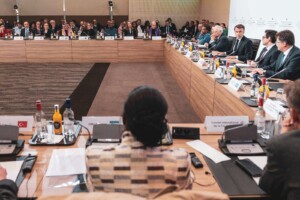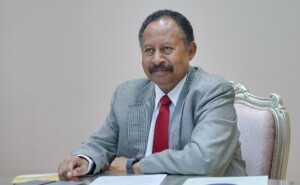Op-ed: At last, a start to justice for Darfur
The first trial by the International Criminal Court on the massive crimes committed in Darfur is finally underway. Ali Kushayb, the well-known Janjaweed leader, will face charges of war crimes and crimes against humanity at the ICC in The Hague on April 4.
 The ICC in The Hague (File photo: RD)
The ICC in The Hague (File photo: RD)
By Salih Mahmoud Osman,
President of the Darfur Bar Association
The first trial by the International Criminal Court on the massive crimes committed in Darfur is finally underway. Ali Kushayb, the well-known Janjaweed leader, will face charges of war crimes and crimes against humanity at the ICC in The Hague on April 4.
This is a momentous event. It has been almost 20 years since the eruption of violence by government forces and government-supported militias in the Darfur region of Sudan, and 15 years since the court started issuing arrest warrants for Darfur suspects. But the survivors and victims have never given up the hope of seeing justice done.
I have devoted my life to promoting respect for the rights of Darfuris, providing free legal representation to those in need in Darfur.
The ICC has been the only chance for justice for the crimes, which killed thousands of civilians and sent millions more fleeing from their homes as the government sought to terrorize the region in response to an insurgency by rebel groups. The Sudanese courts didn’t bring those responsible for these horrible crimes to justice. There was an absence of any political will from the government of Omar al-Bashir to hold perpetrators to account.
Of course, former president al-Bashir, who is also the subject of two ICC arrest warrants on charges of genocide, crimes against humanity and war crimes committed in Darfur – blocked Sudan’s cooperation with the ICC for more than a decade. Survivors’ hopes increased after al-Bashir was ousted in the 2019 revolution. This opened the door to the possibility of sending him with the four other suspects sought by the ICC to The Hague.
But the transitional military council declared that it would never surrender al-Bashir.
The survivors’ hopes were revived by the visits from the ICC prosecutors to Khartoum. Former prosecutor Fatou Bensouda came to Sudan twice and even visited Darfur in 2020, where she was welcomed by cheering crowds in displaced people’s camps there.
The trips resulted in a memorandum of understanding for cooperation between the government of Sudan and the Office of the Prosecutor. The new ICC prosecutor Karim Khan – who took up his post in June 2021 – also travelled to Khartoum, in August 2021 and again in December following the October coup against the transitional government by the military.
The current authorities told Khan that the memorandum of understanding still holds. But today victims and survivors see nothing to indicate that there is anything hopeful about cooperation on the outstanding fugitives. These are, in addition to al-Bashir, Ahmed Haroun, former state minister for humanitarian affairs and former governor of South Kordofan state; Abdulrahim Mohammed Hussein, the former defence minister; and Abdallah Banda Abakaer, leader of the rebel Justice and Equality Movement in Darfur.
Kushayb surrendered voluntarily in 2020 in the Central African Republic, without Sudan’s cooperation.
Even without the other defendants, the Kushayb trial is significant in its own right. It shows that the crimes are not forgotten and those responsible for the crimes can still face justice.
Survivors will never give up hope that al-Bashir and the other fugitives will be held to account at the ICC. Sudanese authorities should transfer the three fugitives in their custody to the ICC and assist the ICC in securing custody of the fourth fugitive, who is a rebel leader. The Sudanese authorities should also facilitate unhindered access by ICC investigators to conduct investigations on Sudanese territory and obtain any relevant documents.
International players that have expressed a commitment to accountability for crimes in Sudan – including the United States and the European Union, also need to send a far stronger signal to Sudanese authorities to cooperate with the ICC’s investigation and prosecution of the crimes.
So much time has passed since the world watched in horror as the government and militias carried out their all-out assault on the people of Darfur, leaving a trail of devastation. But it is never too late for justice. The victims are eagerly waiting.
Disclaimer: The views and opinions expressed in this article are those of the contributing author and do not necessarily reflect the position of Radio Dabanga.
 The author, Salih Mahmoud Osman, is president of the Darfur Bar Association
The author, Salih Mahmoud Osman, is president of the Darfur Bar Association









 and then
and then